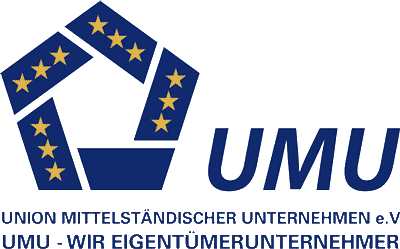Brexit UK a Personal View
von David Caro, Gründer und Inhaber Qualplast Inc. , Birmingham/UK,
Senator im Europäischen Senat der Wir Eigentümerunternehmer, Präsident der European Small Business Alliance – ESBA, Brüssel – London
The United Kingdom is set to hold a referendum on membership of the EU on the 23rd of June.
The important thing to note about the Referendum is that originally it was something not demanded by the British people. The decision to hold a vote on our membership of the European Union was driven by in-fighting within the ruling Conservative Party that threatened to split the Party. It is only the subsequent media frenzy that has prompted public involvement and division. It is disappointing to see that internal Party politics are considered more important than the risk to our national economy!
Over the years since the UK joined the European Economic Community (EEC), as it was known then, in 1973, there has been a general unwillingness on behalf of the British Government to be fully involved with the Union, almost an “at arm’s length” relationship, that gave the impression that we were a little bemused at how things work in a grouping of a type we had never been involved with. Other countries had previous experiences of working together, i.e. Scandinavia, Benelux, Common Market and, to a lesser extent, Federated countries like Germany. The UK, by its nature of looking globally at the Commonwealth and warily at its Continental neighbours, has very little modern experience of forming close relationships and understanding the need to work with others to achieve consensus. Because of this, and taking its lead from government (and 20 miles of sea separation) the British people have become quite insular, for many, the only contact with Europe is 2 weeks every year spent on the Spanish Costas and the EU citizens (many from just 3 countries, Poland, Romania and Bulgaria) that have settled and work in the UK.
Now, driven by Eurosceptic media, predominantly owned by an Australian living in America who, for whatever reason, dislikes the European Union, ever greater claims are being made by both sides of the campaign. None of them lie, but all take messages out of context that suit their own points of view, or make ever greater claims of the doom that awaits us should we either stay or leave. One journalist recently commented that he wakes up each morning fearing what disaster we will be informed of that day, will befall us, if we vote to stay/leave by the various campaign groups. There seems to be a growing anger towards Mr. Cameron for using scaremongering tactics in his claims of the implications of a leave vote which might prove to be counterproductive. It seems that that this is creating more enthusiasm amongst exit voters to turn out on polling day than exists on the remain side, a real challenge to overcome in the run-up to the 23rd.
My biggest disappointment has been the total lack of understanding by the British people about how the EU works and the seeming unwillingness of both sides to address this. It is understandable that the “out” group don’t, but where are the simple explanations from the “in” supporters? In TV interviews with members of the public all over the country one of the most common comments is “we don’t want to be told what to do by an unelected bureaucracy”, this just 2 years after the same people voted for MEP’s to represent them in the European Parliament. How soon people forget! More importantly, people do not seem to realise that it is not the Commission passing laws. Laws are passed by the directly elected European Parliament and the European Council, which is comprised of the Heads of States of the Member States! All the Commission does is propose legislation, often at the request of one or both of the aforementioned bodies.
The immigration crisis that is affecting the whole of Europe is having a great bearing on the way people may vote. Every new immigration news story seems to swing more people to vote “out”. It would appear people don’t understand that, whether the UK is in the EU or out, it will make no difference to illegal immigration into the UK, we already control our own borders as we are not part of the Schengen Agreement, but it is the key argument that the “out” people continue to return to with some success. There also seems to be a “head in the sand” view that should we leave, trade with the EU will continue as normal, but freedom of movement will be abandoned, replaced by a points system similar to Australia, and the EU will just accept this! The usual stories of jobs being lost to foreign workers takes no account of immigration into the UK being split almost equally between EU and non EU citizens and that the UK government is responsible for control of non EU immigration, somehow this fact is lost within the rush to blame Brussels for all our ill’s, something all governments have happily used many times in the past to deflect public opinion away from their own shortcomings. It is also argued by the “out” campaign that we will still be allowed preferential access to the Single Market, generally felt to be a good thing, because we are such a large export destination for EU goods, a market that the EU would not want to lose by imposing too many restrictions on exit.
In a poll held recently by a UK small businesses organisation 47% of small business respondents wanted to stay in the Union and 42% wanted out, but the most notable comment was that there was no reliable, independent, trustworthy source of information that people could turn to for the facts on the implications to their businesses or the country whichever way the vote went. Another interesting fact was that should the UK vote for exit the EU came 4th in the list of areas that the UK should do business with, behind the USA.
Latest polling information, showing 41% each for both sides and 13% undecided, suggests that the result could be very close with many undecided struggling to understand the issues and implications of all the opposing arguments. The final result could be swung by a negative immigration story in the final days before the vote. If we look at betting trends at UK bookmakers then there is a strong trend to remain, not a very scientific measure, but has proved quite accurate in the past and could be the main encouragement to a defensive remain campaign.
Whatever happens here in the UK, the people of Europe have challenged, in the EU elections of 2014, the EU institutions to change and this process needs to be seen to be happening, in other words the European Union and its Member States must re-connect with its citizens. Proposals that do not compromise harmonisation must be returned to Member State jurisdiction. Though the Court of Human Rights is not part of the EU it is a condition of membership that States are required to sign up, many States and their citizens feel that Human Rights legislation puts the Rights of an individual before the Rights of people to feel safe and secure, particularly with the constant terrorism threat. The EU and Member States should be seen to be working together to address these issues that deeply affect citizens not only in the OK, but EU wide.
With three weeks to go anything could happen, and based on events so far, probably will!




